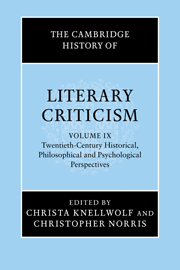Book contents
- Frontmatter
- Introduction
- HISTORY
- MARXISM AND POST-MARXISM
- FROM CULTURAL POETICS TO CULTURAL STUDIES
- PSYCHOANALYTIC APPROACHES
- GENDER AND SEXUALITY
- COLONIALISM, POST-COLONIALITY, NATION AND RACE
- 18 Post-colonial theory
- 19 African American literary history and criticism
- 20 Anthropological criticism
- MODERNITY AND POSTMODERNISM
- PHILOSOPHY, AESTHETICS AND LITERARY CRITICISM
- INTERDISCIPLINARY APPROACHES
- Bibliography
- Index
- References
19 - African American literary history and criticism
from COLONIALISM, POST-COLONIALITY, NATION AND RACE
Published online by Cambridge University Press: 28 March 2008
- Frontmatter
- Introduction
- HISTORY
- MARXISM AND POST-MARXISM
- FROM CULTURAL POETICS TO CULTURAL STUDIES
- PSYCHOANALYTIC APPROACHES
- GENDER AND SEXUALITY
- COLONIALISM, POST-COLONIALITY, NATION AND RACE
- 18 Post-colonial theory
- 19 African American literary history and criticism
- 20 Anthropological criticism
- MODERNITY AND POSTMODERNISM
- PHILOSOPHY, AESTHETICS AND LITERARY CRITICISM
- INTERDISCIPLINARY APPROACHES
- Bibliography
- Index
- References
Summary
I do not care a damn for any art that is not used for propaganda.
W. E. B. Du BoisI have wanted always to develop a way of writing that was irrevocably black.
Toni MorrisonA history of African American literature has to include some discussion of those deceptively transparent terms ‘literature’ and ‘African American’ and the issues raised by their juxtaposition. In recent years poststructuralist and postmodern critical practices have dismantled literary canons and called into question the very notion of literature, yet few literary anthologies are as daring in their selection of texts as The Norton Anthology of African American Literature, published in 1997. The inclusion of folk tales, work songs, spirituals and sermons, as well as a speech and prison letter by Martin Luther King, Jr., an extract from The Autobiography of Malcolm X and lyrics by the rap band Public Enemy, suggests something of the challenge that African American cultural production presents to a conventional understanding of literature. The anthology, which comes complete with CD, dissolves the distinction between ‘high’ and ‘low’ culture and demands a theory of literature which can take account of oral traditions, musical forms and the spoken voice, as well as the often explicitly political content and context of black cultural production. Such a theory of literature, which reconsiders the primacy of the written text and the relation of art to politics and propaganda, would also need to include a recognition of the enforced illiteracy of African Americans during slavery and the role that the concept of writing and literature played in ideologies of white supremacy.
The hybrid term ‘African American’, which is used, paradoxically, to figure the identity of a body of writing, raises a number of complex issues that will also be addressed in this chapter. What, for instance, does it imply about the relationship of black writing in America to the cultural texts, practices and traditions of African and other black diaspora populations? Just as importantly, what is the place of African American writing in ‘mainstream’ American literature? Should the African American literary tradition be viewed as supplementary to the national canon of mostly white authors, or can it be read as challenging the whole rationale behind the selection of the literary works which help define American identity?
- Type
- Chapter
- Information
- The Cambridge History of Literary Criticism , pp. 249 - 264Publisher: Cambridge University PressPrint publication year: 2001
References
- 1
- Cited by

